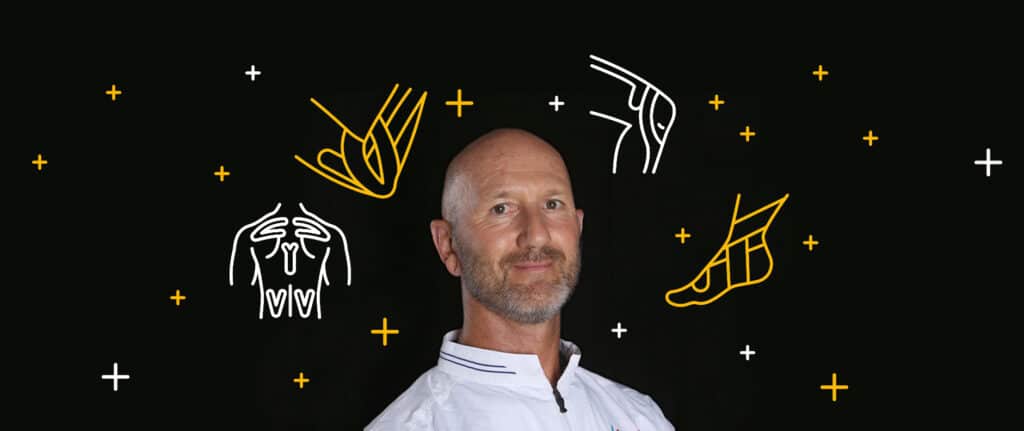
Olivier Pauly, a former elite athlete, has had an active fulfilling career spanning more than 30 years. And it continues, with his involvement in physical preparation and rehabilitation in various sport organizations.
Recognized in the field of sports performance, he has written 9 books on athletics and physical preparation and is a lecturer-trainer in France and abroad.
Pauly took time from his busy schedule to answer our questions concerning his role as a sports performance consultant
Could you briefly introduce yourself, your background, the outline of your resume, the different fields in which you work, your specializations?
I am a professor of physical education and taught 23 years at the University of Nice Sophia Antipolis in France. While teaching, I trained athletics for over 30 years and remain involved in physical preparation rehabilitation in multiple sports. In particular, I was a physical trainer for the Royal Moroccan Golf Federation between 2018 and 2020. I’ve also been working for more than 10 years with sailing and in particular with Jean Baptiste Bernaz, who will participate in his 4th Olympic Games. For more than 3 years I have worked with the French Para-Athletics Federation as a national trainer. I have also written 9 books on athletics and physical preparation and I am a lecturer-trainer in France and abroad.
Could you describe your current mission?
My main mission currently is serving as a National Coach with the French Para-Athletics Federation as part of the preparation for the Tokyo and Paris Games.
What is the role of a consultant-trainer?
I provide my skills, acquired over many years, to carry out performance audits, to improve the conditions to achieve optimum performance, and to implement concrete training solutions.

What types of organizations do you work with?
I work with national and international federations, clubs, training centers, but also with companies and individuals.
How do you integrate the coaching teams? What is the relationship between coaches and consultant?
With the teams already in place, I must improve their work while respecting their singularities, providing more in terms of quality, innovation, and integration of new concepts.
Do you think that federations/organizations should access the expertise of consultants more often to broaden and enhance their perspective?
Several federations consult experts in their respective fields. Hiring an external consultant can pay off in some cases, because the comparison of experiences is always rich.
What added value does a consultant bring to training and coaching?
Being a consultant gives you a certain neutrality and independence of mind that allows you to take a step back.

Why is this important in high performance sport?
In high performance sport, everything moves very quickly and requires anticipation. In addition, we must try to anticipate the expected effects of training, even if we know it’s very complicated. At a minimum, we must establish strategic decisions that lead to good choices.
What about amateur sport?
The difference between amateur and professional sport is not a good example. Indeed, there are so-called “amateur” sports (because they don’t generate a lot of money, or because athletes do not make a living from their activity) which are very relevant and efficient, whereas some professional sports show real shortcomings.
How do you see the evolution of sports preparation/planning in the coming years?
The search for improved performance is becoming more and more complicated and calls on increasingly focused specialists. Collaboration is therefore essential. However, there will always be a need for a project manager, who can synthesize all the ins and outs and make choices that lead to right decisions.
Let’s talk about your other specialization – the creation of educational content. Could you tell us a little more about this?
I’m a trained teacher, so my job is to offer educational content. Being a passionate and very curious person, I got interested in quite a few areas from which I created links. This is what allows me to have global vision and to offer original content.
You use Dartfish solutions for the creation of this content. Could you describe your way of working with these solutions?
Dartfish solutions make it possible to have an advantage in the creation of content, thanks to the integrated tools which make it possible to add computer graphics, to create key images, to measure, etc. It is the vision of the creator to use tools wisely, without information overload, to skillfully integrate and make sense of the content.
When it comes to content delivery, Dartfish channels make it easy and intuitive to organize content. Mobile applications are very useful for immediate feedback in the field when selecting your customized keywords, to stay well organized, and to quickly locate content. I was able to compare the ease of use on the different platforms with which I worked.

What benefits/lessons do you get from using these solutions?
I recognize the quality and convenience of Dartfish solutions, which I’ve been using for over 20 years now. It is a most beneficial tool. Dartfish is well suited for an expert market. My close collaboration with Dartfish has provided me with significant benefits for many years in the use of Dartfish tools. I have participated frequently in the development of the software and I have advantageously opened the doors of deployment of Dartfish in French territory, among others. I continue to promote it, since developing a solution for the Royal Moroccan Golf Federation, as well as for the French Para-Athletics Federation. The tools are very efficient, but without the support of a sufficiently rich structure, it would be difficult to get to the end of the concept.



Comments are closed.